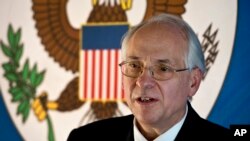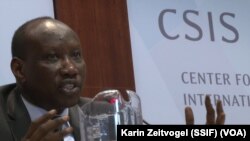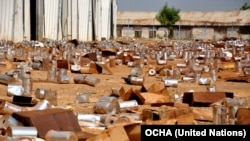WASHINGTON —
U.S. Special Envoy to South Sudan and Sudan Donald Booth says Washington's threat to slap sanctions on anyone violating human rights or obstructing the peace process in South Sudan is not just a hollow warning but will be put into action unless the warring sides in the young country stop fighting and respect a peace deal.
"As I have continually warned, for those who continue to obstruct the peace process, we will take action," Booth told South Sudan in Focus in an interview.
President Barack Obama signed an executive order nearly two weeks ago, clearing the way for U.S. visa bans and the seizure of assets held by anyone found to be stoking violence, violating human rights and blocking efforts to end the conflict in South Sudan.
The executive order was necessary, Booth said, because a cessation of hostilities agreement signed in late January has been repeatedly violated.
"Over the two months since that agreement was signed, there has been constant fighting, constant violations of that agreement," Booth said.
"That's one of the reasons why...we have moved forward with President Obama signing the executive order -- to try to convince the parties that have not respected the agreement that they have signed, to do so." he said.
The executive order should not be looked at as a threat of punishment, but as "an incentive -- a carrot, if you will -- to those who are trying to do the right thing," Booth said.
"This gives them some additional room for maneuver, gives them some leverage over those who would obstruct trying to move forward and honoring the cessation of hostilities agreement," Booth said.
Deteriorating conditions in a war zone
South Sudan's Minister in the Office of the President, Awan Riak, said during a visit to Washington last week that "there is a need for the U.S. as a midwife of the birth of the country of South Sudan, not to abandon us at this time and say it is punishing (us)."
"If there is anything we need most, it is support, not just punishing us," Riak said.
Both the opposition and government have said they are not worried by the threat of U.S. sanctions, insisting that it is the other side that has been violating the ceasefire agreement while they have been trying to restore peace.
The two sides are set to resume peace talks in the Ethiopian capital at the end of this month, after a three-week recess.
During that time, the United Nations has sounded the alarm that famine could hit South Sudan, as the ongoing fighting prevents farmers in parts of the country from planting crops and forces thousands of South Sudanese to flee their homes and farms.
The U.N. Children's Fund (UNICEF) has warned that 50,000 South Sudanese children could die of hunger this year unless the international community steps up with more aid for the young country.
And at an urgent meeting in Washington at the weekend, top humanitarian officials from the United States, the United Nations and European Union warned that they have already seen the first signs of famine in South Sudan.
Booth said the delivery of humanitarian assistance in South Sudan has been "frustrated," with aid workers threatened and harassed, life-saving shipments confiscated, and aid supplies looted -- in spite of the fact that the warring sides agreed in the cessation of hostilities agreement to allow humanitarian workers unimpeded access to people in need.
The best way to ensure that South Sudan is not hit by famine and major disease outbreaks, on top of the four-month-old conflict, would be "to stop the fighting," Booth said.
"The fighting continues to displace South Sudanese, the fighting continues to put those South Sudanese who have been displaced, as well as many others, at grave risk of not only disease but potentially - in some areas of the country - of famine," Booth said.
"We do not want to see the people of South Sudan face famine or major disease outbreaks. We want to try to get a handle on this... We need to get the fighting stopped, we need to get the cessation of hostilities respected, including the delivery of humanitarian assistance," he said.
Booth said Riak's visit to Washington was a step in the right direction.
"We had very fruitful and constructive discussions on ways forward, to try to bring about an end to the fighting and to try to bring about a true political process that will address the underlying issues in South Sudan," Booth said.
He also praised the unstinting efforts by East African bloc the Intergovernmental Authority on Development (IGAD) to broker a peace deal between the warring sides in South Sudan.
The United States is working "very closely with IGAD to figure out a way" to deploy a regional force that would work with and protect verification teams who have been tasked with monitoring and reporting on any violations of the January cessation of hostilities agreement, the U.S. diplomat said.
"The priority is to bring about an end to the fighting so that the South Sudanese can start a true political dialogue on how to put their country back together," Booth said.
The headquarters for verification teams have been set up in Juba; teams are already in place in Bor and Bentiu, the capitals of Jonglei and Unity states, and another verification unit is set to be deployed in Malakal, the capital of Upper Nile state.
Thousands of people have fled all three towns, which have seen heavy fighting as government and opposition forces have fought for control of them.
But the driving reason behind the United States' commitment to peace in South Sudan remains its desire to "to bring about an end to the suffering of the people," Booth said.
"The best way to help them right now is to focus on bringing about an end to the fighting and to get the political discussion to establish South Sudan on a firm footing" that will prevent the world's newest nation from boiling over into "conflicts like this" in the future and will give the people of South Sudan real hopes for "a much brighter future for their children," Booth said.
Listen to the entire interview by clicking on the link below.
"As I have continually warned, for those who continue to obstruct the peace process, we will take action," Booth told South Sudan in Focus in an interview.
President Barack Obama signed an executive order nearly two weeks ago, clearing the way for U.S. visa bans and the seizure of assets held by anyone found to be stoking violence, violating human rights and blocking efforts to end the conflict in South Sudan.
The executive order was necessary, Booth said, because a cessation of hostilities agreement signed in late January has been repeatedly violated.
"Over the two months since that agreement was signed, there has been constant fighting, constant violations of that agreement," Booth said.
"That's one of the reasons why...we have moved forward with President Obama signing the executive order -- to try to convince the parties that have not respected the agreement that they have signed, to do so." he said.
The executive order should not be looked at as a threat of punishment, but as "an incentive -- a carrot, if you will -- to those who are trying to do the right thing," Booth said.
"This gives them some additional room for maneuver, gives them some leverage over those who would obstruct trying to move forward and honoring the cessation of hostilities agreement," Booth said.
Deteriorating conditions in a war zone
South Sudan's Minister in the Office of the President, Awan Riak, said during a visit to Washington last week that "there is a need for the U.S. as a midwife of the birth of the country of South Sudan, not to abandon us at this time and say it is punishing (us)."
"If there is anything we need most, it is support, not just punishing us," Riak said.
Both the opposition and government have said they are not worried by the threat of U.S. sanctions, insisting that it is the other side that has been violating the ceasefire agreement while they have been trying to restore peace.
The two sides are set to resume peace talks in the Ethiopian capital at the end of this month, after a three-week recess.
During that time, the United Nations has sounded the alarm that famine could hit South Sudan, as the ongoing fighting prevents farmers in parts of the country from planting crops and forces thousands of South Sudanese to flee their homes and farms.
The U.N. Children's Fund (UNICEF) has warned that 50,000 South Sudanese children could die of hunger this year unless the international community steps up with more aid for the young country.
And at an urgent meeting in Washington at the weekend, top humanitarian officials from the United States, the United Nations and European Union warned that they have already seen the first signs of famine in South Sudan.
Humanitarian aid 'frustrated'
Booth said the delivery of humanitarian assistance in South Sudan has been "frustrated," with aid workers threatened and harassed, life-saving shipments confiscated, and aid supplies looted -- in spite of the fact that the warring sides agreed in the cessation of hostilities agreement to allow humanitarian workers unimpeded access to people in need.
The best way to ensure that South Sudan is not hit by famine and major disease outbreaks, on top of the four-month-old conflict, would be "to stop the fighting," Booth said.
"The fighting continues to displace South Sudanese, the fighting continues to put those South Sudanese who have been displaced, as well as many others, at grave risk of not only disease but potentially - in some areas of the country - of famine," Booth said.
"We do not want to see the people of South Sudan face famine or major disease outbreaks. We want to try to get a handle on this... We need to get the fighting stopped, we need to get the cessation of hostilities respected, including the delivery of humanitarian assistance," he said.
Booth said Riak's visit to Washington was a step in the right direction.
"We had very fruitful and constructive discussions on ways forward, to try to bring about an end to the fighting and to try to bring about a true political process that will address the underlying issues in South Sudan," Booth said.
He also praised the unstinting efforts by East African bloc the Intergovernmental Authority on Development (IGAD) to broker a peace deal between the warring sides in South Sudan.
US working 'closely with IGAD'
The United States is working "very closely with IGAD to figure out a way" to deploy a regional force that would work with and protect verification teams who have been tasked with monitoring and reporting on any violations of the January cessation of hostilities agreement, the U.S. diplomat said.
"The priority is to bring about an end to the fighting so that the South Sudanese can start a true political dialogue on how to put their country back together," Booth said.
The headquarters for verification teams have been set up in Juba; teams are already in place in Bor and Bentiu, the capitals of Jonglei and Unity states, and another verification unit is set to be deployed in Malakal, the capital of Upper Nile state.
Thousands of people have fled all three towns, which have seen heavy fighting as government and opposition forces have fought for control of them.
But the driving reason behind the United States' commitment to peace in South Sudan remains its desire to "to bring about an end to the suffering of the people," Booth said.
"The best way to help them right now is to focus on bringing about an end to the fighting and to get the political discussion to establish South Sudan on a firm footing" that will prevent the world's newest nation from boiling over into "conflicts like this" in the future and will give the people of South Sudan real hopes for "a much brighter future for their children," Booth said.
Listen to the entire interview by clicking on the link below.







